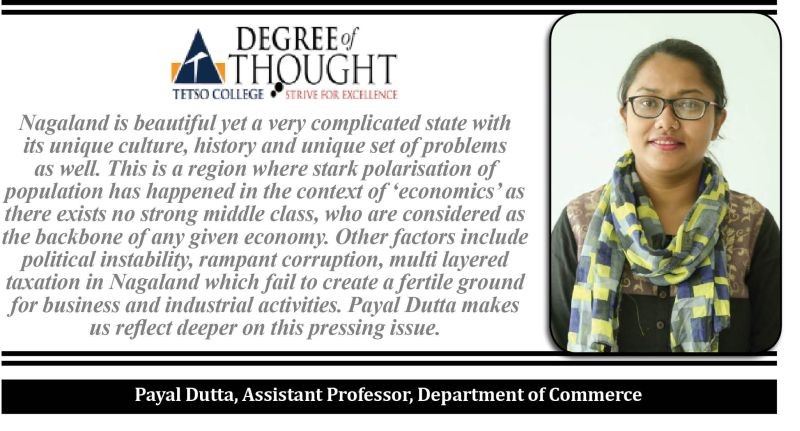
It is true that the Nagaland we see today is not the same around 70 years back, but it is also not quite as expected as it has to be. The state has been struggling with economic growth and multiple factors are at play.
Based on the general perception by people, a state’s growth is mainly viewed in correlation with healthcare facilities available, the educational system, the transport system, growth of business enterprises, and so on. But who is responsible for the economic development of the state? Is it the political leadership? The citizens? Or is it a collective responsibility?
According to the periodical labour force survey conducted by the National Statistical Office (NSO), Ministry of Statistics and Programme Implementation during 2017-18, the unemployment rate in Nagaland for persons aged 15 years and over was 21.4%, which is the highest. The state had 682,000 youth ages 15 to 29 years in 2016, which is an increase from the national average of 27%. This increases the pressure on employment prospects for youth in the mostly agrarian state. Even though the agricultural sector employs over 60% of the state’s workforce, it contributes to less than 30% of the state’s gross domestic product (GDP).
The Nagaland 2030 vision document says that the elasticity of employment in agriculture is -0.43%, so the state must devote more focus to developing employment in secondary and tertiary sectors, which constitute 15% and 54.5% of GSDP, respectively.
To raise private investment into Nagaland, a concerted effort will be needed to improve the state’s infrastructure, which may only be possible with increasing peace and co-existence in the state.
Corruption and a lack of entrepreneurial activities are the root causes of the stagnant economic growth of our state. These issues need to be addressed from the grassroots level. Every single member of the society, including me, writing this piece and you reading it, is responsible. If every single member of society starts taking matters into their own hands, things might change. That’s where the saying goes, “Rome was not built in a day”
Entrepreneurship can be defined in different ways, though a simple definition describes it as the process of starting your own business. The individual undertaking the undertaking is known as the entrepreneur. An entrepreneur aims to create value by identifying business opportunities, managing risks appropriate to the opportunity, and mobilizing human, financial, and material resources to bring a business into existence.
Taking a risk is part of business, but it is usually not visible. It has been observed that people are reluctant to take up a project that involves sometimes even a marginal risk. Establishing a new unit is indeed not an easy task, but easy things are not necessarily profitable. In order to put in place a new unit one must first acquire resources from all directions. The main concern here is that the organization must have adequate funds to begin that enterprise.
However, we are seeing many new entrepreneurs taking advantage of the demand for these small businesses by seeking loans and microfinance options for their funding. When it comes to entrepreneurship, anyone who is looking to become an entrepreneur need not start by opening a large business. They can instead start a small company, perhaps running a small bakery.
When entrepreneurship is talked about in the state, many omit the innovation aspect of it and the diversity it conceals. In Nagaland, people see the scope of entrepreneurship in a very limited space and restrict themselves within a few areas which creates saturation, insignificant profitability, and a general flat economic overcome for individuals and the state. This needs to change.
While the state government has been increasingly devoting time to promote the entrepreneurship culture in the state and many are trying to grasp everything that is being served on the platter, innovation is largely ignored. While it is understandable that most entrepreneurs are first-generation and things might take time, but it is equally true that time is running out and Nagaland is falling years behind even compared to the neighbouring state. It is time to invest heavily in innovation.
Nevertheless, the perception of entrepreneurship and the start-up sector has improved with greater acceptance from the general population and from small pineapple farmers to social entrepreneurs, to cold mountain tea harvesters, the range of start-ups in Nagaland is broad.
Ease of Doing Business Index places Nagaland in the Aspirers Category, ranking it 28th out of 36 participatory states. Their ranking indicates a desire to reform and attract private investment.
With the onset of the pandemic, we can see that years of theoretical knowledge has finally changed into reality. Many individuals are beginning their own businesses and maybe a shift can be observed in our economic system in terms of development in the years to come.
It is the right time for the state and the people to come together and bring some reforms that should ensure smooth entrepreneurship growth. The first thing that should be taken care of is building better infrastructure, improving connectivity, identifying markets, and inspiring innovation. These four are interlinked and might be void in the absence of one another. There is no point in creating a product if it perishes during transit in the absence of a proper storage facility. Similarly, if the products are not diverse and innovative enough, the markets will reach saturation points soon and vanish.
Degree of Thought is a weekly community column initiated by Tetso College in partnership with The Morung Express. Degree of Thought will delve into the social, cultural, political and educational issues around us. The views expressed here do not reflect the opinion of the institution. Tetso College is a NAAC Accredited UGC recognised Commerce and Arts College. The editors are Dr Hewasa Lorin, Dr Aniruddha Babar, Nisha Dahiya and Meren. For feedback or comments please email: dot@tetsocollege.org






